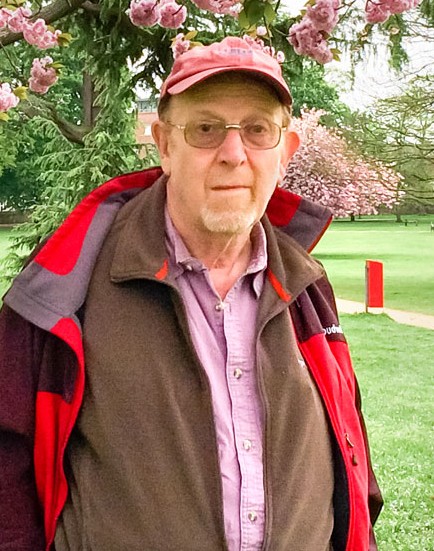Paul Hyams, expert on medieval law, dies at 82
By Kate Blackwood
Paul R. Hyams, professor emeritus of history in the College of Arts and Sciences and a leading scholar of the history and practice of law in the Middle Ages, died Dec. 4 of lymphoma in Oxford, England. He was 82.
Colleagues and former students remember Hyams as an innovative and multidisciplinary scholar who reached from history into literature, law, medieval studies and beyond through a pedagogical approach that combined intellectual rigor with camaraderie.
“Paul was a notoriously provocative and sharp-eyed scholar, moving between many of our scholarly worlds in the vast expanses of medieval culture, bristling as he went,” said Andrew Galloway, the James John Professor of Medieval Studies in the Department of Literatures in English (A&S).
Hyams was a generous mentor who always had time for his students and colleagues, said Nicole Marafioti, Ph.D. ’09, a professor of history at Trinity University in San Antonio, Texas.
“He could spend hours dissecting a historical problem, or asking questions about a new project, or debating the details of your work,” Marafioti said. “Conversations with Paul lasted for years and were never really finished; we could always pick up where we left off, with a new idea or fresh insight.”
A member of the history department faculty at Cornell from 1989 to his retirement in 2013, Hyams was also an adjunct professor at Cornell Law School starting in 1990. He served as director of Cornell’s Medieval Studies Program (2001-07) and as director of the Cornell Program for Law and Society (1992-97).
Hyams was a keen analyst of law in its social contexts in the Middle Ages, said Andrew Hicks, associate professor of music and director of the Cornell Medieval Studies Program (A&S), and had a particular fondness for “the hard-to-love technical details” of criminal law, dispute settlement and legal procedure in post-Conquest England.
In addition to publishing many influential articles, including “Trial by Ordeal” (1980) and “The Charter as Source in the Early Common Law” (1991), Hyams authored the books, “Kings, Lords, and Peasants in Medieval England” (1980) and “Rancor and Reconciliation in Medieval England: Wrong and its Redress from the Tenth to Thirteenth Centuries” (2003).
At Cornell, Hyams organized many major events, bringing to Cornell the Haskins Society International Conferences (1998-2002). In 2008, he organized the Cornell Conference on Medieval Poverty.
For years, Hyams hosted Sunday brunches in West Campus and North Campus dining halls, where guest faculty members led lively discussions on everything from fiction to biology to computer science.
“His approach to the scholarly community felt truly unique. He enjoyed being somewhat of a gadfly, in the Socratic sense, at scholarly gatherings, challenging established scholars and making everyone rethink what they thought they knew,” said Ada Kuskowski, Ph.D. ’13, an assistant professor of history at the University of Pennsylvania. “On the other hand, he was the absolute champion of graduate students and junior scholars.”
Hyams enjoyed teaching, and created unique opportunities – most famously his interdisciplinary brunches – for undergraduates to fall in love with ideas, Kuskowski said.
“Ever curious and engaged, his great breadth of spirit transcended law, the Middle Ages, history and even the humanities,” Kuskowski said. “He will have us thinking and pushing the field in new directions for a very, very long time.”
Hyams studied at Oxford University, graduating from Worcester College in 1968. He was appointed Scurry Jones Junior Research Fellow at Jesus College in 1965. Four years later, he was elected to a Fellowship at Pembroke College, Oxford. For 20 years, he was a Fellow and Tutor in History at Pembroke, where he was also heavily involved in college life.
Hyams was a member of and leader in many professional organizations, including: the American Historical Association; the American Society for Legal History; the Jewish Historical Society of England and the Yorkshire Archaeological Society. He served as an editorial adviser for Academia Press, Albion, and Law and History Review.
Hyams was elected as a Fellow of the Royal Historical Society and as a Corresponding Fellow of the Medieval Academy of America. In 2014, he was honored with a special issue of Reading Medieval Studies, “Law’s Dominion in the Middle Ages: Essays for Paul Hyams.”
After his 2013 retirement from Cornell, Hyams returned to Oxford, England.
Paul Raphael Hyams was born in Leeds, Yorkshire, England, in 1940. He referred himself as a “true Yorkshireman,” said Margaret Washington, professor of history emerita (A&S).
“The Hyams family lived ‘Tikkun olam,’ the concept in Judaism of action toward ‘repairing the world,’” said John Weiss, associate professor of history emeritus (A&S).
“All historians hope to leave the world a more enlightened place, a goal that many do achieve,” Weiss said. “To leave the world a more ‘exampled’ place, as husband, father, social critic, citizen, as Paul has, is an achievement far less common.”
Hyams is survived by his wife, Elaine, and his children Deborah Hyams of London and David Hyams of Salt Lake City, Utah. A funeral service and burial were held on Dec. 7 at Wolvercote Cemetery, Oxford; memorial services will be held in the spring of 2023 in Oxford.
Media Contact
Get Cornell news delivered right to your inbox.
Subscribe

